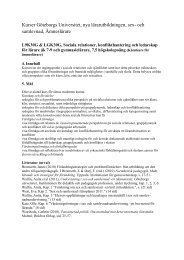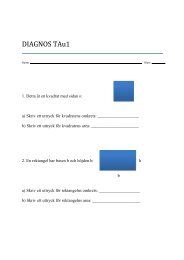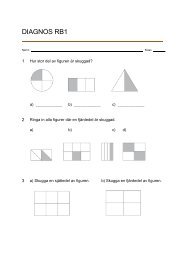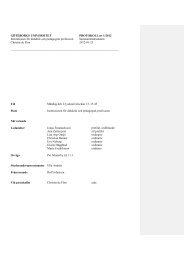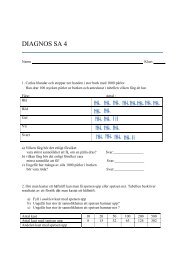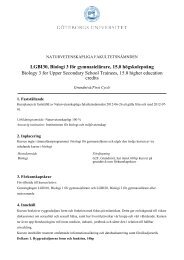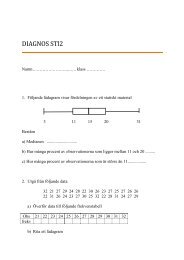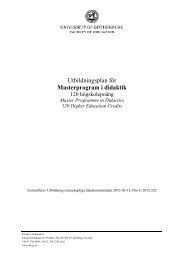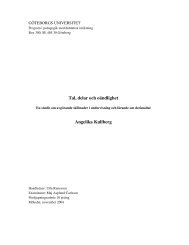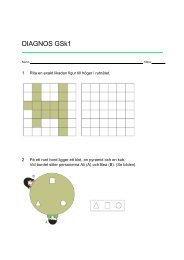What is Science?
What is Science?
What is Science?
Create successful ePaper yourself
Turn your PDF publications into a flip-book with our unique Google optimized e-Paper software.
<strong>What</strong> <strong>is</strong> <strong>Science</strong><br />
• Miia Rannikmae ( appendix 1 )<br />
Some Assumptions about <strong>Science</strong><br />
A. THE WORLD IS REAL. In other words, the physical universe<br />
really does ex<strong>is</strong>ts, apart from our sensory perception of it.<br />
B. HUMANS CAN PERCEIVE AND UNDERSTAND the physical<br />
universe. In other words, we can learn correctly how the natural<br />
world works and operates.<br />
C. NATURAL PROCESSES (empirically-accessible processes)<br />
are SUFFICIENT to explain, or account for natural phenomena<br />
or events. In other words, scient<strong>is</strong>ts must explain the natural in<br />
terms of the natural.<br />
D. SCIENTISTS ASSUME THAT NATURE "OPERATES"<br />
UNIFORMLY in both space and time (unless we have evidence<br />
to the contrary). Th<strong>is</strong> <strong>is</strong> known as the PRINCIPLE OF<br />
UNIFORMITY.<br />
Aspects of the Nature of <strong>Science</strong><br />
It <strong>is</strong> Tentative<br />
Scientific knowledge <strong>is</strong> subject to change with<br />
new observations and with the reinterpretations<br />
of ex<strong>is</strong>ting observations.<br />
.<br />
Aspects of the Nature of <strong>Science</strong><br />
It <strong>is</strong> Empirical<br />
Scientific knowledge <strong>is</strong> based on and/or<br />
derived from observations of the natural<br />
world.<br />
Scient<strong>is</strong>ts collect evidence by conducting<br />
investigations.<br />
1
Inferences<br />
Nature of <strong>Science</strong><br />
Inferences are interpretations of those<br />
observations.<br />
Perspectives of current science and the<br />
scient<strong>is</strong>t guide both observations and<br />
inferences.<br />
It <strong>is</strong> Socially and Culturally Embedded<br />
<strong>Science</strong> <strong>is</strong> a human endeavour and <strong>is</strong> influenced by<br />
the society and culture in which it <strong>is</strong> practiced.<br />
The values of the culture determine what and how<br />
science <strong>is</strong> conducted, interpreted, accepted, and<br />
util<strong>is</strong>ed.<br />
Illusions<br />
<strong>Science</strong> <strong>is</strong> Creative<br />
• Do you see the face<br />
Or an Eskimo<br />
Scientific knowledge <strong>is</strong> created from human<br />
imaginations and logical reasoning.<br />
Th<strong>is</strong> creation <strong>is</strong> based on observations and<br />
inferences of the natural world.<br />
.<br />
2
<strong>Science</strong> has Laws and Theories<br />
• But are theories and laws connected Does<br />
a theory become a law when we have<br />
enough evidence NO<br />
• Laws describe relationships, observed or<br />
perceived, of phenomena in nature.<br />
• Theories are inferred explanations for natural<br />
phenomena and mechan<strong>is</strong>ms for relationships<br />
among natural phenomena.<br />
• Hypotheses (in school science often called<br />
predictions) may lead to either theories or laws<br />
with enough supporting evidence and<br />
acceptance in the scientific community.<br />
<strong>Science</strong> <strong>is</strong> Subjective<br />
• Although scientific investigation strives for<br />
objectivity and reproducability, it cannot escape<br />
the human nature of the investigators.<br />
• The development of questions, investigations,<br />
and interpretations of data are filtered through<br />
the lens of current accepted theories and laws.<br />
Traditional v Contemporary Model of<br />
Theories in the Nature of <strong>Science</strong><br />
1. Theories are based<br />
directly on observation.<br />
2. New theories are<br />
improvements over old<br />
theories because<br />
observations improve<br />
and increase over time.<br />
3. An entire theory <strong>is</strong><br />
falsified if subject to a<br />
single contradictory<br />
fact.<br />
1. Observations are theory<br />
laden.<br />
2. Theories are the<br />
inventions of scient<strong>is</strong>ts.<br />
3. The occurrence of a<br />
contradictory fact does<br />
not necessarily compel<br />
the abandonment of a<br />
theory.<br />
Nature of <strong>Science</strong><br />
Would you accept that <strong>Science</strong> involves:<br />
• Creating Hypotheses<br />
• Undertaking Observations<br />
• Drawing Inferences<br />
• Developing Theories<br />
• Recogn<strong>is</strong>ing Laws<br />
And would you accept that science involves<br />
them in th<strong>is</strong> order<br />
3




